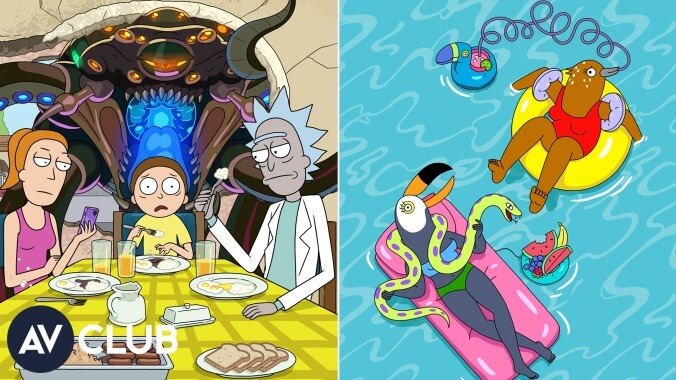Rick & Morty and Tuca & Bertie's creators on the Roomba-like feeling of working from home
Dan Harmon and Lisa Hanawalt discuss how COVID shifted the ways they make their Adult Swim series
TV Features Roomba
There was an extended moment in 2020 where it seemed like pop culture as we knew it would cease to exist. The cancellations, closures, and indefinite postponements in response to the COVID-19 pandemic were racking up and—while ultimately the least of our country’s worries—it seemed as if we’d be left to watch re-runs until further notice. But there was always hope that animation could push forward, to deliver entertainment not relegated to the Zoom chat window; after all, what’s more quarantine-friendly than recording voiceover in the confines of a sound isolation booth?
While, yes, the industry rather quickly found a way to get actors (safely) back on set, animated series were already moving full steam ahead, with some slight modifications to how they get the job done. Among them were Adult Swim’s cultish-ly adored Rick & Morty, returning for its fifth season, and the equally beloved Tuca & Bertie, arriving to its new network home for season two after getting the untimely axe at Netflix. Ahead of the shows’ returns this month, The A.V. Club joined Rick & Morty co-creator Dan Harmon and Tuca & Bertie creator Lisa Hanawalt in conversation, discussing the pivot to remote work on their respective seasons and how that shaped every step of the process, from writing and storyboarding to animating to recording actors from their “at-home studios” (which, at least initially, consisted of blanket forts for soundproofing). In doing so, Hanawalt stumbled upon a metaphor—that working from home is a bit like being a human Roomba—that got stronger the more the creators unpacked it. You can read Harmon and Hanawalt’s thoughts on the Roomba metaphor below, and watch our full interview with the pair above, in which they also discuss how they define the limits of their animated worlds’ realities and share what shows first opened their eyes to the power of animation.
The A.V. Club: Lisa, I’m curious how [working remotely] felt on your end, especially as you’re diving back into the show and trying to figure out what season two would look like.
Lisa Hanawalt: I mean, luckily, I had a while to think about it while we were kind of in limbo waiting for the word. So we really hit the ground running. I knew what I wanted to say, I knew what I was interested in doing with the characters—in fact, I had too much and couldn’t cram it all into one season, which is always fun. And then our writers’ room is really small and intimate and mostly writers I’d already worked with in person, so it wasn’t too difficult to have a rapport with them.
I don’t know, it was weird working in isolation—like, I actually really like working from home; It’s very comfortable. I hate commuting. But sometimes it just feels like you’re on an island. Like, I felt like a Roomba that someone had just pressed on, “ON” and like, “Okay, show-run!” [Laughs.] But I kind of like that, I like having low supervision.
AVC: But, like a Roomba, you eventually get caught on a corner in the kitchen and then you’re just bouncing up against the wall again and again.
LH: Yeah, and then the Roomba calls its producers, like, “I need help!” [Laughs.] This analogy is falling apart. It was crazy at times to be working, like, during a pandemic and wildfires at the same time—that was a weird time. But it went relatively smoothly considering.
Dan Harmon: I do think that the Roomba metaphor is actually extra applicable because of how much harder it must be for younger shows, because it’s just so many more glitches. And, if you don’t already have a shared shorthand and a momentum to your production pipeline—in which case you can just be like, “Oh, we can clearly see what’s going wrong because we’re working over laptops.” But for a new show and a new showrunner, I can’t imagine what it’s like for somebody out there who is making a pilot for the first time and not knowing what they’re supposed to expect.
LH: Oh my god. Yeah, if this had been my first season, I don’t know how I would have done it. I mean, it would have been impossible. But, because I had the experience of doing a season in person and working on BoJack for many years, it came together pretty easily.
DH: The Roomba knows where the walls are!
LH: I know where the walls were, yes! [Laughs.]
AVC: See this metaphor is great! We talked ourselves back into it.
Tuca & Bertie’s second season premieres on Adult Swim on June 13. Rick & Morty returns for its fifth season on June 20.
Image Credit: Adult Swim

1 Comment
The conditions of the COVID-19 pandemic seem to have given us a learning opportunity for how to adjust work setups in a way that something like the Spanish Flu did not.
COVID is still as deadly and problematic as ever, taking places such as Brazil and India as examples. But the Spanish Flu (or H1N1) was so much more immediately deadly, it necessitated much harsher working restrictions immediately. But then as it passed on, the restrictions that were in place, lifted, with the many dead buried, if any restrictions had been put in place in time anyway.
So “what to do to prevent a pandemic from devastating your community and workplaces” didn’t become an enduring guideline. Hopefully, the lessons from the COVID year will not disappear in the same way that any lessons that we could have had from the Spanish Flu seemed to have faded.